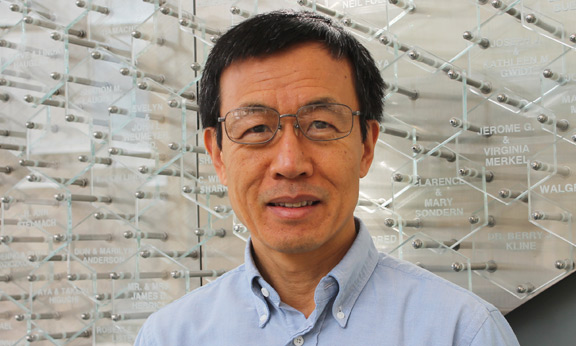
Public and private funds will further the research efforts of Lian Yu, professor in the Pharmaceutical Sciences Division. These new projects range from the diversity of crystal forms, to the development of a nano-coating technology to produce low-cost stable amorphous formulations for global health, and the investigation of crystal nucleation in amorphous drugs and solid dispersions. These projects are supported by the Bill & Melinda Gates Foundation, AbbVie, Eli Lilly, and the National Science Foundation.
The Bill & Melinda Gates Foundation is supporting Yu’s research to build on the discovery that amorphous drugs have very high surface mobility and undergo fast surface crystallization. Ultra-thin polymer coatings will be used to immobilize surface molecules and enhance stability. This strategy will be applied to develop stable amorphous formulations with high drug loading that are relevant for global health. The development of this nano-coating technology will enable high drug loading and reduced pill burden, a current medical need in the treatment of HIV AIDS and other diseases.
The study supported by AbbVie will investigate crystal nucleation in amorphous drugs and solid dispersions. A central issue in developing amorphous pharmaceutical formulations is their stability against crystallization. Crystallization consists of nucleation and crystal growth. While recent work has greatly improved the understanding of crystal growth in amorphous drugs, our knowledge is severely lacking about the nucleation process. This process is important because the absence of crystal nuclei in a product means no risk of crystallization, while any product that contains crystal nuclei is poised to crystallize given the opportunity. The study will advance our understanding of crystal nucleation in amorphous drugs and solid dispersions.
Yu will collaborate with Eli Lilly and Company under its Drug Product Design 2020 Initiative to develop ground-breaking science and innovative technologies that will allow digital design of the right solid form for the right drug product the first time. This work will combine computational crystal structure prediction and experimental confirmation of predicted structures to advance the ability to predict crystal structures from a chemical diagram, prior to synthesis of the molecule.
Yu’s research interests include Solid-state chemistry; Crystallization; Polymorphism; Amorphous solids and glasses; Surface mobility; and Polymeric crystallization inhibitors.